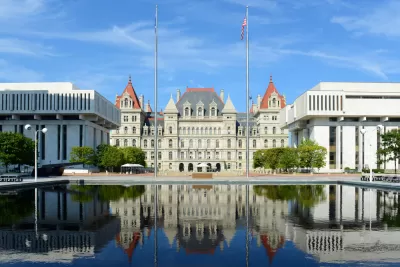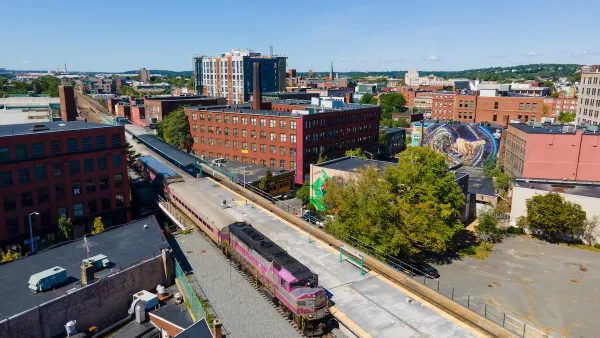State governments like to limit local taxing authority but not local zoning—maybe they should do the exact opposite.

When I was listening to a speech about street design, I heard repeated references to the state government—about what "Albany" (the state of New York) will allow New York City to do and what it won't allow the city to do. This incident made me wonder: Where should we draw the lines between state and local authority?
The dominant American view seems to be that the local governments have almost-total control over zoning, but very little control over anything else. In particular, statewide politicians like to gain political support by claiming credit for cutting local property taxes, or by preventing local governments from instituting new taxes.
It seems to me, however, that this distribution of state and local responsibilities is absolutely backwards. Why? I begin with two assumptions:
- Normally, a city’s residents and politicians know how to run their own affairs to a greater extent than do nonresident politicians (such as state legislators from other cities or from rural areas).
- An exception to this principle exists when a) a city’s actions significantly harm nearby towns (e.g. by allowing pollution that crosses municipal boundaries) or (b) there is a "tragedy of the commons" problem (where a certain policy is good for each individual municipality, and thus widely adopted, but is harmful to the region as a whole).
So how do these assumptions apply to specific policies? First, it seems to me that local governments should have nearly absolute power to set their own tax rates and decide their own mix of rates, with no state interference. For example, there is no reason why the governor of New Jersey should have more power over Piscataway's tax rates than the voters of Piscataway. The governor might have visited Piscataway once or twice while running for office, but otherwise has no special expertise in local affairs. Similarly, nearby towns are not harmed if Piscataway's tax rates are too high: if anything, they benefit if Piscataway overtaxes itself, as people and businesses move to those towns. Similarly, there is no "tragedy of the commons" issue: it is not particularly rational for an individual town or suburb to overtax itself. Ideally, state constitutions would give local governments plenary power over taxes (with the possible exception of taxes that affect nonresidents, such as hotel taxes).
On the other hand, the case for local control of zoning is much weaker. The "local expertise" argument (assumption 1 above) may still apply to zoning. However, restrictive zoning clearly creates a "tragedy of the commons" problem. It is rational for each city's homeowners to have highly restrictive zoning, to limit the housing supply and thus increase property prices. In cities with rent control, it is also rational for renters to prefer restrictive zoning, since they are unlikely to move and thus do not benefit from new construction.* For the same reasons, it is rational for neighborhoods within a city to prefer restrictive zoning.
However, restrictive zoning is irrational for a city or region as a whole: it leads to stunted housing supply, thus increasing housing prices, thus keeping out poor and middle-class workers and new residents generally. In fact, recent economic scholarship suggests that zoning even harms the national economy. Because restrictive zoning is rational for each city or neighborhood but irrational for the region as a whole, state governments should rigorously police local zoning.
In sum, state governments are active where they should be passive, and passive where they should be active.
*Indeed, it could be argued that even ordinary renters benefit from restrictive zoning in certain circumstances: where new housing is more attractive than the existing housing stock, thus making the neighborhood more attractive and raising rents for everyone. This claim too involves a tragedy of the commons: it is more likely that new housing will make one neighborhood especially attractive if it is confined to that area, while new housing in every neighborhood is not likely to make one area attractive relative to others, which in turn means that new housing is more likely to bring down rents everywhere.

Planetizen Federal Action Tracker
A weekly monitor of how Trump’s orders and actions are impacting planners and planning in America.

Congressman Proposes Bill to Rename DC Metro “Trump Train”
The Make Autorail Great Again Act would withhold federal funding to the system until the Washington Metropolitan Area Transit Authority (WMATA), rebrands as the Washington Metropolitan Authority for Greater Access (WMAGA).

The Simple Legislative Tool Transforming Vacant Downtowns
In California, Michigan and Georgia, an easy win is bringing dollars — and delight — back to city centers.

The States Losing Rural Delivery Rooms at an Alarming Pace
In some states, as few as 9% of rural hospitals still deliver babies. As a result, rising pre-term births, no adequate pre-term care and "harrowing" close calls are a growing reality.

The Small South Asian Republic Going all in on EVs
Thanks to one simple policy change less than five years ago, 65% of new cars in this Himalayan country are now electric.

DC Backpedals on Bike Lane Protection, Swaps Barriers for Paint
Citing aesthetic concerns, the city is removing the concrete barriers and flexposts that once separated Arizona Avenue cyclists from motor vehicles.
Urban Design for Planners 1: Software Tools
This six-course series explores essential urban design concepts using open source software and equips planners with the tools they need to participate fully in the urban design process.
Planning for Universal Design
Learn the tools for implementing Universal Design in planning regulations.
Smith Gee Studio
City of Charlotte
City of Camden Redevelopment Agency
City of Astoria
Transportation Research & Education Center (TREC) at Portland State University
US High Speed Rail Association
City of Camden Redevelopment Agency
Municipality of Princeton (NJ)





























